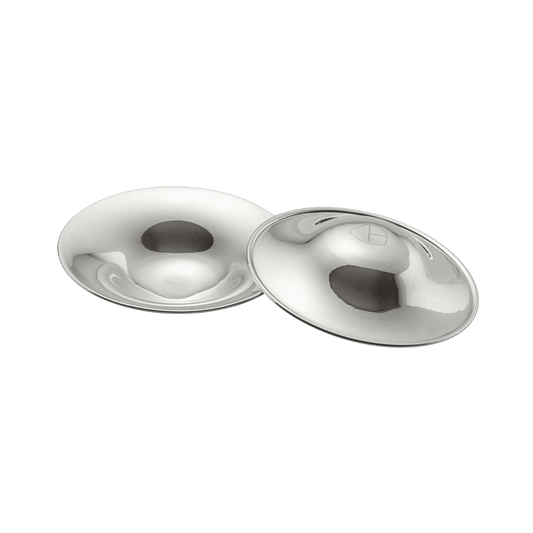In this article you’ll find some simple and useful tips for breastfeeding your baby, starting from those first few important hours of their life. We will also talk about what you can do if you find breastfeeding painful and if you develop sore nipples, breast engorgement, or mastitis.
Breastfeeding in the first few days: tips for a successful start
Babies are born with a sucking reflex,and therefore, they are able to latch on to the breast on their own.
For the best possible start to breastfeeding, it’s crucial that your baby is offered your breast within the first hour of their lifeand that they have skin-to-skin contact immediately after the birth.
Rooming-in is another important aspect: a baby should always stay in the room close to their mum, except for health reasons.
Pain and discomfort while breastfeeding
Experiencing pain while breastfeeding is never normal. My advice is toconsult a professional immediately who can assist in understanding the cause and help correct any errors being made.
It’s very important to make sure that:
- You’re in a comfortable positionwhilst breastfeeding to avoid strain on your shoulders, back and arms. A nursing pillow is a great help.
- Your baby is positioned correctly: mum and baby should be tummy-to-tummy, your baby’s ear, shoulder, and hip should be in a straight line.
- Your baby has latched on properly: their lips should be turned outwards, in a suction position, almost all the areola should be in their mouth, their cheeks should seem full and not dimpled. The only noise to be heard should be swallowing and not sucking, as no air should enter the mouth.
If all of the above are followed, then no pain should be felt. Otherwise, you need to find out what is causing your discomfort.
Sore cracked nipples
Breastfeeding is not always so straight forward, and you can sometimes encounter a few small problems, although this shouldn’t discourage you.
If your baby isn’t attached well at the breast, sore cracked nipples can develop, i.e., small cuts varying in size, which may or may not bleed depending on their severity. These cracks can occur on the nipple horizontally, vertically, diagonally, in the middle or at the base of the nipple.
Rule number one: carry on with breastfeeding. I suggest you squeeze out a few more drops of milk at the end of a feed, and spread it all over the nipple and areola area, then let the breast air dry.
Koala Silver Cups (silver nipple shields) combined with Vitamin E Oil, can help soothe and relieve sore cracked nipples.
Breast engorgement
Another problem which may occur is breast engorgement. This happens when any one of your breast segments doesn’t drain sufficiently, properly, or evenly during a feed and may also cause milk ducts to become blocked. These areas feel harder and more painful to the touch. Breast engorgement should be treated immediately.
Again, rule number one is the same: carry on with breastfeeding.
First of all, with the help of a professional, check the position you are using to breastfeed is enabling your breast to drain fully and properly. If this is not the case, ask for support on how to adjust your position to allow each breast segment to drain freely.
Following on from that, get some extra help. Before latching your baby onto your breast, warm up your breast either with a warm cloth, a hot water bottle or directly under hot water from the bathroom tap or shower.
When your breast is warm, massage it to soften the hardest and most painful areas, and finally, before offering your breast to your baby, squeeze it with your hands to get a few drops of milk out of the milk pores. You’ll find that your baby will latch on more willingly and easily to a soft breast and it will be easier for them to empty it fully.
Mastitis
If breast engorgement is not treated and resolved straight away, mastitis may develop. In most cases, mastitis causes a woman’s breast to become painful, inflamed and often red. A high body temperature is often the most obvious symptom.
Once again, rule number one is: carry on with breastfeeding, even if it is not too pleasant. I advise you consult a medical professional, as you may need antibiotic treatment to resolve mastitis completely.
Simple but helpful tips for a trouble-free breastfeeding experience
Here are a few simple and helpful tips on how to ensure your breastfeeding journey is pleasant and trouble-free.
Adopt a ‘breastfeeding on demand’ mindset
Avoid a set breastfeeding schedule, instead arm yourself with patience to find your (and your baby's) personal rhythm. Try breastfeeding on demand, by listening and observing to your baby’s cues.
Don't pay too much attention to false myths about a mum’s diet when breastfeeding
Don't pay too much attention to the many false myths surrounding a woman’s diet whilst breastfeeding. Don't give up eating certain foods, as your baby discovers different tastes thanks to your milk.
Don't listen to rumours about breast size and milk
Don't believe the false rumours which link breast size and shape to your quantity of milk, such as: "You have large breasts, you’ll have no problem and will definitely have lots of milk", "You have small breasts, you may not even have any milk?!", "Your breast is very soft, that means there’s not enough milk!".
Before you believe all of this type of talk, consult a professional and talk to them about you doubts and concerns. A very large breast may have little glandular tissue and a lot of fat, whereas a small breast may have a lot of glandular tissue.
Soft breasts are a good indication that breastfeeding is going well, that mum and baby have found perfect harmony and that a woman’s breast has found the right equilibrium between filling and emptying.
Don't allow for long intervals between feeds
"How lucky are those mums whose babies let them sleep all night without waking up for a feed!" some will say. On the contrary, you shouldnever allow your breasts to become too dense, therefore, never let too many hours pass between one feed and the next.
In fact, in such a case, the Lactation Inhibition Factor (FIL) is naturally activated straight away, which slows down milk production in order to protect your breasts and prevent breast engorgement and mastitis.
Therefore, before considering yourself very lucky to be able to sleep through the night without waking up for a feed, think about how important it is to continue frequently with breastfeeding. I hope that this article has proved helpful, and I wish you a wonderful breastfeeding journey.
Martina Rossi, a Healthcare Professional in Midwifery
A healthcare professional midwife, she graduated from the MarchePolytechnic University and then undertook a two-year master's degree in independent midwifery management of physiological pregnancy at the University of Modena and Reggio Emilia. She currently works and specialises in the field of pregnancy, assistance during labour and birth, and support with breastfeeding. She also deals with pelvic floor rehabilitation, obstetrical services such as tampons and pap smear tests, as well as obstetric consultations.








